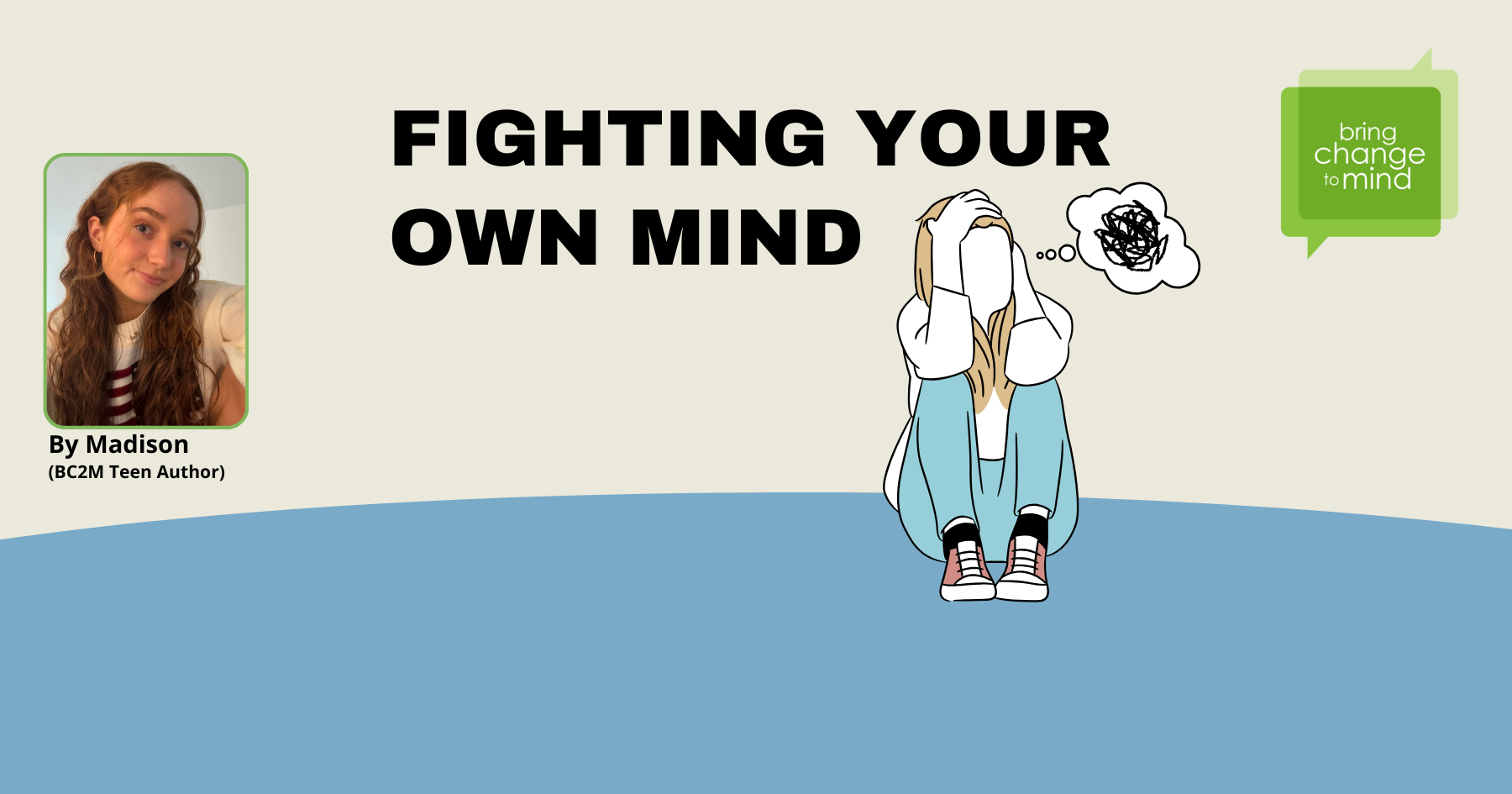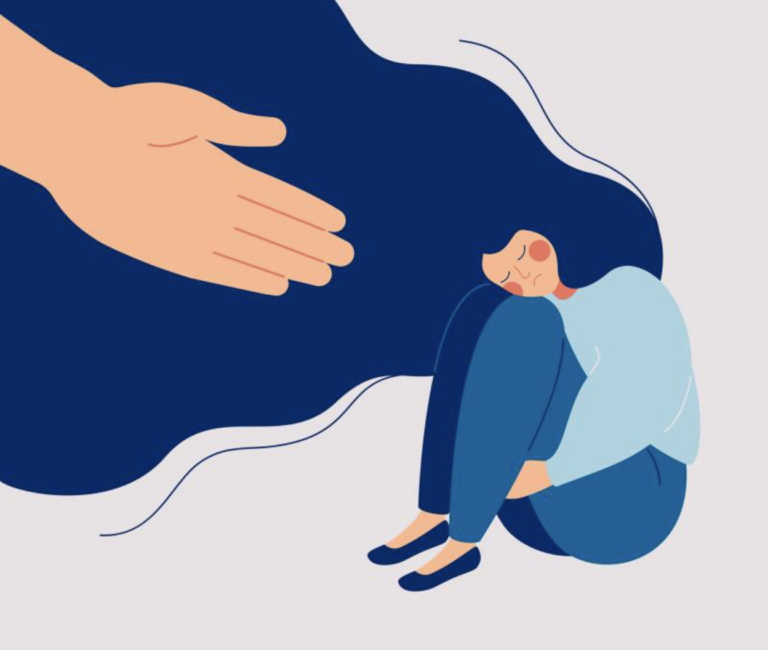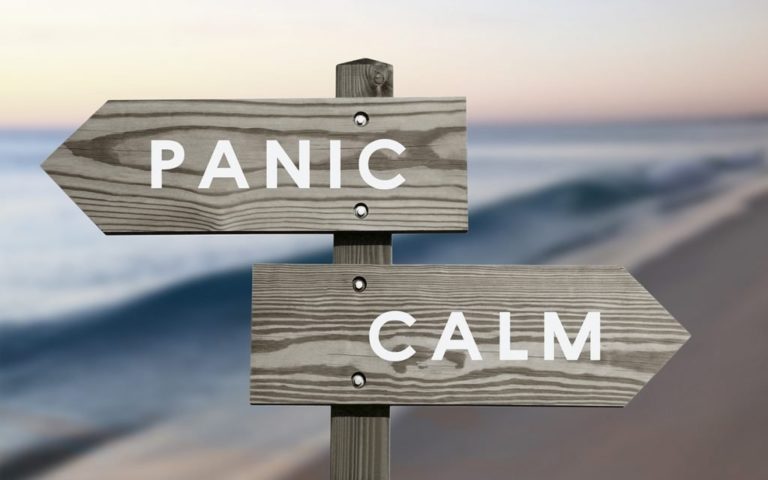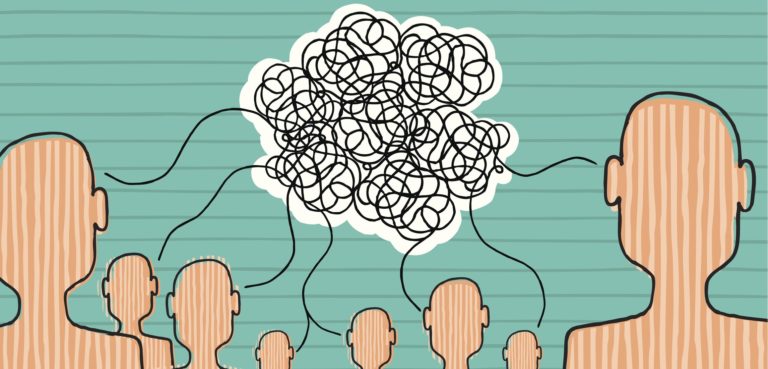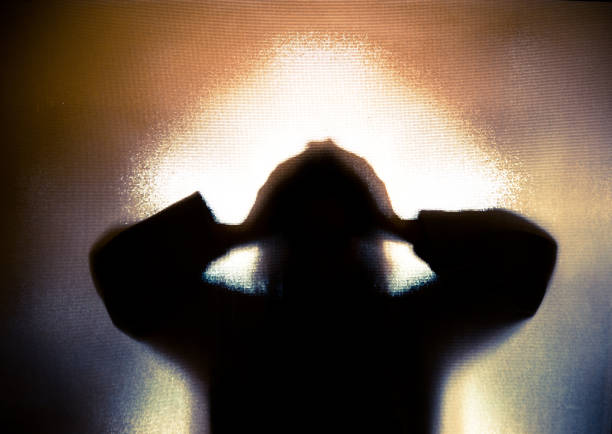Fighting Your Own Mind
People often tease me about how my laugh sounds. They say it’s more like a cackle than the charming giggle most people expect. I don’t mind their comments—I laugh along with them. But I’m the only one who truly knows how hard I had to work to be happy.
I’m a junior in high school and the president of the Bring Change to Mind club at my school. I lost my father to suicide in February of my freshman year, was diagnosed with depression and anxiety midway through my sophomore year, and now, at the start of my junior year, I’m the healthiest and happiest I’ve ever been. That’s a lot to unpack, so let me go back and explain my story.
My father was my best friend in every way a person could be. He battled bipolar disorder his entire life and lived to the best of his ability. Looking at my dad, the only thing you would see is his big, pearly white smile. After talking to him, though, you could see just a fraction of the demons he fought every day in his head. Growing up with my dad constantly fighting to be the version of himself he longed to be for my family made me see the detrimental effects of mental illness at a very young age. While painful, I’m grateful for the deeper understanding of psychology I gained early on. I believe this is where my passion started.
There were highs and lows, but no matter if it was a good or bad day, my dad was my family, and I loved him regardless of whether he could love himself that day. On February 14, 2023, my father lost his battle after years of fighting to the absolute best of his ability. Watching this tragedy unfold before me led to this eerie feeling of impending doom. I mean, life was good; we had just gotten a new puppy, we were planning to move into the house of our dreams, and he still decided to take his own life. I couldn’t stop thinking about what this meant for me. The second you would look at my dad, you would admittedly be intimated; he had the most muscle I’ve ever seen on one person, tattoos, and was six feet tall, and if he lost his battle with his mind, how would the five-foot-two, puny, little girl be able to win hers?
This thought spiraled in my mind for months as I tried every day to push the idea into the depths of my mind. By the beginning of my sophomore year, the shock and denial had all worn off, and my depression was in full effect. I look back on pictures of myself during this time and I barely recognize myself. While I thought my pain was obvious, to everyone around me, my depression managed to stay completely hidden. In private, I began losing hair, self-isolating, and gaining and losing weight rapidly; my grades began to plummet, my face and skin lost all the radiance they once held, and my sleep patterns became increasingly concerning. Every day, I would wake up dreading the thought of leaving my bed; the second the door to my room opened, I would put on a smile that I wished more than anything was real. I would go through the entire day at school, trying not to allow any of my friends to notice the deep depression I had fallen into.
Focusing in class would physically hurt my head and by the end of the day, my cheeks burned from the fake smile I had upheld the whole day. The second I got home, I would climb into bed and go back to sleep. Being asleep felt like my escape, as I could escape the darkness of my mind. By the time I woke up, my mom would beg me to eat something. Within one hour of being awake, I would be lying back in my bed, mindlessly scrolling on my phone or staring at the ceiling. I wouldn’t be able to fall back asleep until the early morning hours and would wake up and fall back into the cycle again. The idea of living this cycle now makes me sick, but at that time, this was the best I could do.
I’ve never been a lazy person; if I’m not productive, I get horrible anxiety. But this cycle was my way of punishing myself; living like this made me feel terrible about myself and I thought that’s what I deserved.
After five months of this, I had fully become a shell of myself and that’s when I began to seek help from my therapist and psychologist. With their help, I started medication, which gave me the energy to fight to get myself back. Even with this extra motivation, a small part of me still wanted to be miserable because I believed I deserved to feel that way.
Then, one day, everything changed. I had to desire all on my own to fight. The thing that saved my life was not anyone or anything.
One day, I decided to choose myself.
I spent so long working against myself, thinking this was how I deserved to live. The moment I realized that I owed myself a fair fight and that I wanted to get better and find myself again was when everything changed.
I started going to the gym and finding ways to keep myself productive.
I changed my diet so that I would feel good about the foods I was letting into my body.
I went back and found the relationships I know are important and reestablished them.
I found myself again because I realized that I was worth fighting for.
Now, I tell this to anyone who will listen: you can’t force it to happen; there’s no magic spell to say or code to put in. The second you decide to choose yourself, everything changes. But when you choose yourself, things begin to change. Mental illness is a battle in your mind, but your mind can also become your greatest ally. I’ve had to sacrifice and learn so much, but I do not think I would be the person I am today without enduring all I have gone through. Surviving depression has granted me the opportunity to empower other teenagers to fight for themselves because I promise you are worth it! There will always be somebody else who is hoping you’re ok, so fight for their sake if you don’t want to fight for yourself …yet.
At sixteen, I’ve already learned so much about resilience, and I’m excited to keep learning. Life is messy, beautiful, and hard, but I’m having so much fun figuring it all out. After everything I’ve been through, even hearing jokes about my laugh feels like a blessing—because I’m here and I can laugh again. I’m thrilled to pursue a career in psychology and explore how we can use the very tool that sometimes harms us—our minds—to heal and thrive.
If you or someone you know is struggling, reach out.
There is help. There is hope.
BC2M Portal Resources:

